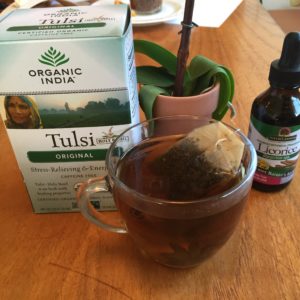Balance Tea

Balance Tea Recipe
Ingredients:
- 1 bag Tulsi tea
- 1 cinnamon stick
- 1 star anise
- 2 cups water
- 1 dropper of licorice tincture or 1 bag of licorice tea
- Bring 2 Cups of water to a boil with star anise and cinnamon stick.
- Simmer 5 minutes.
- Pour into glass and steep Tulsi tea bag for 3 mins.
- Add licorice root.
Directions:
Healing Properties:
Tulsi Tea
Tulsi, also known as Holy Basil, is called the “Queen of Herbs” and is considered sacred in Hindu culture. The plant was discovered over 5000 years ago, and is widely cultivated in India and other countries in Southern Asia. The word Tulsi means “incomparable plant” — with good reason — it is absolutely packed with phytonutrients that give it a huge variety of potent healing properties. Tulsi is considered an adaptogenic herb, meaning that it is non-toxic, and can help the body to normalize its functions. It’s anti-microbial, anti-inflammatory, anti-oxidant, and anti-fungal. It acts as an immunomodulator, and is a powerful regulator of cortisol, making it a top choice for stress management.
Helps with stress:
This powerful adaptogenic herb has abilities to both help the body to adapt to stress, and to protect the body from the effects of stress. Adaptogens like Tulsi condition the nervous system to more effectively deal with stress, and then to quickly return to a state of balance once the stressor is gone. Tulsi can help improve energy levels and endurance. It can soothe nerves, and help with headaches. Most important, It has the ability to help lower cortisol levels in times of stress, making it a top choice for stress management.
Anti-inflammatory and anti-oxidant:
Studies have shown that Tulsi contains compounds that are proving to be effective in treating the pain and inflammation associated with joint disorders. Additionally, Tulsi is one of the richest sources of ursolic acid, a phytochemical with anti-oxidant properties that is being researched for its ability to support detoxification, reduce inflammation and promote normal cell growth.
Liver, kidney, and digestive health:
Tulsi can protect the liver from the damaging effects of xenobiotics — man-made chemicals that have hormone-like effects in the body. These chemical compounds, known as EDCs, “endocrine disruption compounds”, impede fat metabolism in the liver and trigger damaging cascades throughout the body that affect many fundamental mechanisms, including metabolism.
Essential oils contained in Tulsi give it the ability to dissolve kidney stones. Tulsi is also a great diuretic and detoxifier. Consuming Tulsi is great for digestion, too, as it helps to regulate metabolism, and improves absorption and assimilation of fats, carbohydrates, and proteins.
Immune System enhancement and relief for viruses including common colds:
Recent studies found Tulsi to be effective both in fighting swine flu and in speeding up recovery time. Drinking Tulsi on a regular basis during flu season can help enhance the immune system, lessening the likelihood of coming down with the virus. If you happen to catch a common cold, essential oils, including camden, eugenol, and cineole within Tulsi will help with coughs and to expel phlegm.
Licorice
Licorice root is an adaptogenic herb that has been used in Traditional Chinese Medicine for over 3000 years. Its botanical name, Glycyrrhiz Glabra, comes from ancient Greek, meaning “sweet root”. It is fifty times sweeter than sugar, so it’s aptly named! Licorice root has dozens of uses, but for this cleanse we are taking a closer look at its potent anti-viral qualities, and remarkable ability to help with adrenal fatigue and other hormonal issues.
Licorice root as an anti-viral remedy:
Licorice contains a potent anti-viral compound called glycyrrhizin, part of a group of botanical compounds known as Triterpenoids. It has been confirmed to be anti-viral in studies, as it boosts levels of interferon, a key immune system component that fights attacking viruses. Licorice is easy to take as a tincture, in capsules, or brewed as a tea, which is delicious!
Caution: Glycyrrhizin can cause the following side effects: increased blood pressure, reduced potassium levels, and edema. Check with your doctor If you have heart, liver or kidney issues, or are pregnant; it’s not advised to take licorice in these cases. Deglycyrrhizinated licorice, or DGL, does not cause side effects, but this type is primarily used for digestive issues.
Licorice root for adrenal fatigue and hormone balance:
Licorice root is one of the main adaptogenic herbs used to regulate cortisol. If you are experiencing adrenal fatigue, licorice can help your body to more efficiently regulate levels of cortisol, giving your adrenals a much-needed break. Licorice can also help you balance your hormones - it contains a flavonoid called glabradin, which functions as a phytoestrogen. It can be very helpful with symptoms of PMS, and with hot flashes.
Dosing:
A little bit of licorice can go a long way! If you are self-dosing, start slowly, and increase your dose weekly. A suggested starting dose is 300 - 450 mg maximum/day for the first week. Check with your doctor, and don’t take licorice for more than six weeks without a break.
Star Anise
Chinese star anise is a beautiful medicinal spice that is shaped like an 8-armed star. It has outstanding anti-viral properties, as well as being strongly anti-microbial, anti-fungal, anti-oxidant, and anti-inflammatory.
Anti-viral:
These star-shaped pods contain shikimic acid, a potent phytochemical that is used in Tamiflu, a prescription anti-viral medication. Shikimic acid works to prevent viral replication, and is effective against several types of viruses, including herpes. Interestingly, Italian researchers have found that when shikimic acid is combined with quercitin, an antioxidant-rich phytonutrient, immune function can be bolstered even further, to better resist viral infection.
Anti-microbial, anti-inflammatory, anti-oxidant, and anti-fungal:
Anethole, the essential oil in star anise that gives it its licorice flavor, has been found to be effective against both E. coli, and Staphylococcus aureus infection. In addition, researchers in Taiwan found that four antimicrobial compounds in star anise are effective agains 67 drug-resistant strains of bacteria. Anethole has anti-inflammatory properties as well - its compounds have shown to be as effective as the anti-inflammatory drug indometacin. Powerfully anti-oxidant, star anise can also kill fungus. South Korean researches have found that extracts and essential oils in star anise showed the ability to fight Candida albicans.
Note:
Be aware that there is also a Japanese variety of star anise, but this one is poisonous! It’s not intended for internal use, and is largely sold in bulk, as an ingredient for potpourri. Just be sure that what you purchase is labelled “Chinese”, or is packaged as a culinary spice.
Cinnamon
Powerful extracts from both cinnamon bark and leaf oil are showing to be highly anti-microbial in various studies. While essential oils can be taken internally, we suggest that if you choose to take cinnamon oil internally, choose a very high quality oil, such as Young Living, and consult a medical professional.
In the meantime, just cooking with cinnamon, or infusing cinnamon sticks in tea is a safer alternative, that can be very helpful against a range of viruses.
Current research is showing cinnamon extracts such as Cinnamaldehyde (from the bark), and Eugenol (from the leaf) to be very effective against different strains of viruses. Cinnamon extracts are showing promise in studies against HIV-1 and HIV-2, Adenovirus, and Herpes Simplex 1 and 2. Interestingly, according to a Stanford University article, during the Spanish Flu outbreak in 1918, workers at cinnamon factories seemed to be immune to the virus! A popular remedy at the time was cinnamon in either powder or oil form, mixed with milk.
A potent anti-viral cinnamon extract has been developed by Dr. Michael Ovadia, a professor from Tel Aviv University. Dr. Ovadia developed the extract to have such potential uses as an air disinfectant against flu viruses in airports and hospitals, and as an alternative to the flu vaccine. His patent is still pending, but this sounds like one to watch for!


 Dana Walsh (featured in the Lyme documentary UNDER OUR SKIN) and Brent Martin, founders of Lyme Less Live More, identified a giant gap while recovering from Lyme Disease --
Dana Walsh (featured in the Lyme documentary UNDER OUR SKIN) and Brent Martin, founders of Lyme Less Live More, identified a giant gap while recovering from Lyme Disease --